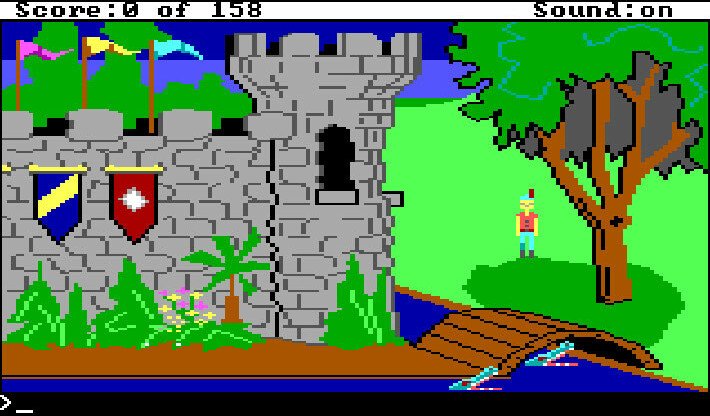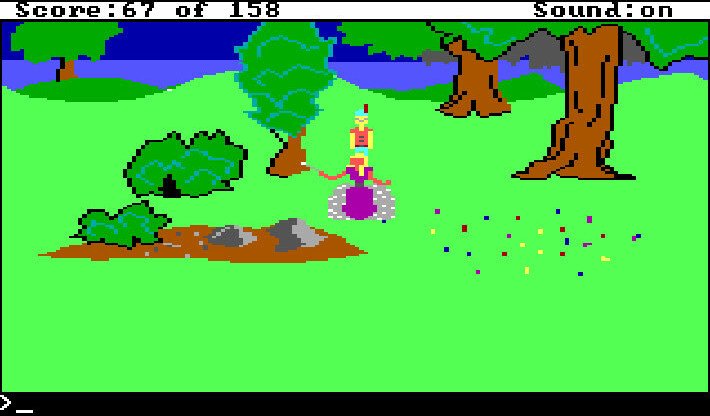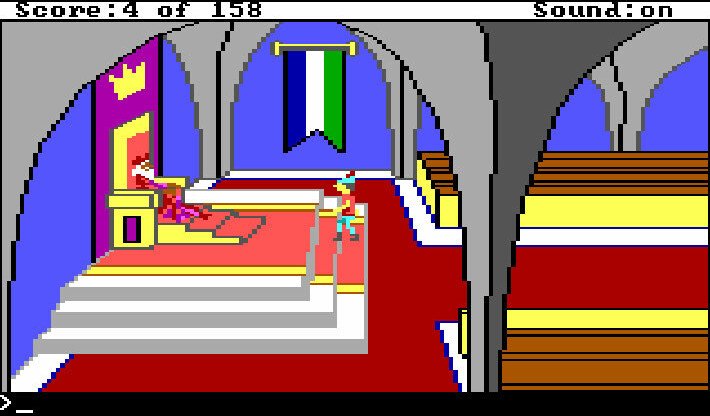There’s a particular type of non-arcade puzzle-solving story game, which these days is often built on tapping into the nostalgia of people who were children in the 90s. These games, which I refer to as ‘narrative adventures,’ tend to draw on a small number of specific genre signifiers. Back in the 90s, the two big common threads between the forms were the ‘Lucasarts’ genre of games, which tended to be designed without failure states, and ‘Quest’ genre of game, which tended to relate to failure more actively.
Basically, the vibe was that you couldn’t die in Lucasarts games, and you couldn’t lose either. Lucasart games were always going to give you room to make progress, so anything that could work was going to work, which meant the game could eventually break down into trying everything on everything else. By comparison, Quest games could kill you to signal ‘hey, don’t do that.’
And the game that set the pace, that started the mechanisms for both of these genres was Kings Quest 1.
It’s known generally as the first graphical adventure game, for a given value of graphics. Previous iterations on the idea of a graphical adventure game included things you and I might recognise as MUDs or Roguelikes – ascii maps, randomly generated spaces, with specific letters signifying player characters, that kind of thing and so on. It’s never as simple as a binary, ‘before’ and ‘after’ graphics, when it comes to these things.
But still, Kings Quest is generally seen as the first game of its type with a graphical map and a text interface. This meant that objects could have spatial relationships that they didn’t normally have. See, it’s easy to observe the way that the Kings Quest model added a dimension of space to the way games like this played, but less obviously, it also itnroduced an element of time. Most puzzle games didn’t work with a timer the way this one did, and most of them couldn’t be as random as this one.
If you just try and finish King’s Quest there’s a good chance you’ll wind up finding most of multiple routes that finish the game. Finishing the game some way or another doesn’t mean finishing all the puzzles, which means the adventure has replayability. There’s random systems, ways to lose the game you can’t control, and random things that can make the game ‘easier’ in ways you don’t necessarily understand.
Kings Quest‘s game play and systems have been subjected to something of a rennaisance, as an interesting example of a speedrun game. The tool-assisted speedrun of Kings Quest sets a time in fifteen seconds, moving as fast as the cycles of the computer can handle a computer program designed forty years ago. And that’s more of the way this game exists in a historical space, the way that this game on its own serves as a sort of icon of all sorts of permutations beyond it.
You can chart the history of a genre of games starting from King’s Quest; it’s a good, solid place to start, a beginning bookend for the genre of videogame it represents, and the experiences of a generation. If you started playing videogames in 1996, sure, videogames were different to this, but this was still a game you might find, and be able to run, on a computer you had at that time. The games were engaging beyond the immediate, even though they do look pretty ropy. And computers advanced very quickly from where Kings Quest was playable on the fastest setting. It was a game made for such slow computers, by our standards, that there was no concession made to giving the game an internal clock or something to limit how fast it could run.
Because I mean how fast could a computer get? It was a new form, a new thing, and getting computers that could load and run Kings Quest at all was going to take a beastly machine. Roberta Williams famously said that she used to write games for people with PhDs, not because they had to be smart, but because who else had a computer that was capable of running this game?
The first version of Kings Quest, now known as Kings Quest I, was released May 10, 1984. I was a bit over a year old. In fourteen days, the state I live in, New South Wales, would pass legislation decriminalising homosexual behaviour between men. Now particularly picky people amongst you will note that, hey, in my first few years of childhood, I didn’t live in New South Wales, I lived in Victoria! And to that I say: yes, thanks, sis, that doesn’t contribute anything to the story.
The point is that Kings Quest is an old game. But it’s not older than me. And when I was born, homosexuality between two private individuals in the most populous state of the country was illegal and punishable by jail time. We had a prison that was made to be a men’s prison for sodomy. The government had passed legislation saying it shouldn’t be illegal, but that law wasn’t binding – it needed to be passed by the states (and the territories followed suit).
I’m not saying gay marriage here. I’m saying that when Kings Quest first launched in 1984, two men having a homosexual relationship was punishable by fines and jail time in New South Wales. The last state in Australia that repealed the laws against homosexuality was Tasmania, which only did it because the federal government forced them to. This was in 1997, which is after the last proper Kings Quest game was ever released. Between the release of Kings Quest 1 and Kings Quest 7, Australia went through the stages of decriminalising homosexual acts. The federal government passed a law explaining that states should do that in 1971.
Australia as a country is currently ranked as the fifth most accepting country of homosexuality worldwide as of the last national census.
We talk about the history of videogames about their place in terms of products and commercial exchanges. Most sales, most prices, most successful. But it’s necessary to remember that these things are products of cultures. These games are made in countries that are doing other things, that relate to the politics and social climate of where they are, and trust me when I tell you anyone who wants to act like queer justice has been attained and that things were ‘a long time ago,’ then I want to remind you that while I was alive, someone had to repeal a law to make sure I didn’t go to jail if I kissed a guy. It was not that long ago, and honestly, people who tell you it was that long ago are probably trying to peel you away from your friends and allies so you can be given reasonable sounding bullshit about hating trans people.



2 Trackbacks